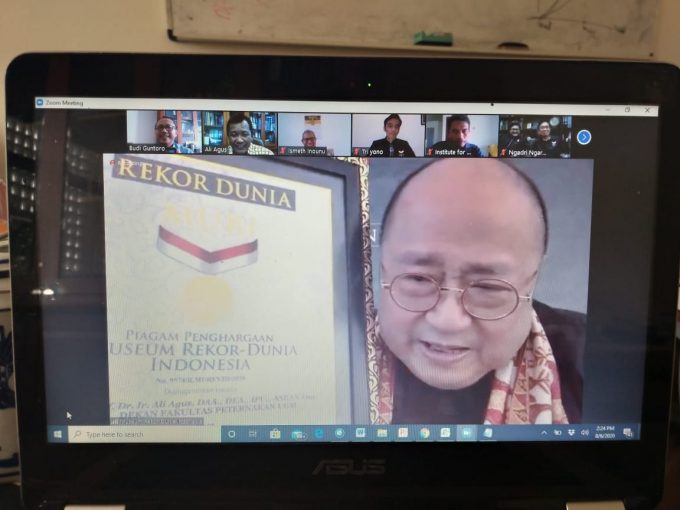
Two researchers from the Faculty of Animal Science (FAS) UGM, namely Prof. Dr. Ir. Ali Agus, DAA., DEA., IPU., ASEAN. Eng and Ir. Dyah Maharani, S.Pt., M.P., Ph.D., IPM received an award from the Indonesian Record Museum (MURI) for their research in making a complete feed fermentation technology “feed burger” and a DNA marker tool. The awards were given online on Thursday (6/8).
“Complete feed fermentation technology “burger feed “has been developed since the last 15 years. The development of feed technology is based on the fact that generally beef cattle breeders provide feed in the form of straw, corn sugarcane, and concentrate feed derived from agricultural and industrial waste such as rice bran, coffee husks, cocoa, etc. which have relatively low nutritional quality,” Ali said after receiving the award, Thursday (6/8).
To improve the nutritional quality of feed, Ali Agus developed a feed burger coupled with multi-microbes called feed burger sauce to improve its nutritional quality. Thus, when cows consume feed with the addition / treatment of feed burger sauce, the nutrition and digestibility increases so that it can further increase livestock productivity. For beef cattle, it can accelerate livestock growth.
“The feed burger is an easy, cheap, safe and good technology. Feed burgers are made from straw, rice, wheat bran, molasses and microbial solution. Straw is an easy and cheap material. The fermentation process also only lasts 24 hours,” Ali said.
FAS UGM has implemented the making of feed burgers when the Merapi eruption occurred in 2010. Animal feed burgers are a solution for providing quality animal feed for tens of thousands of cows belonging to farmers affected by the eruption.
Another researcher, Ir. Dyah Maharani, S.Pt., MP, Ph.D., IPM, revealed that the modern diet tends to consume foods that trigger an increase in cholesterol in the blood, which if not balanced can lead to degenerative diseases such as coronary heart disease, diabetes, and high blood pressure.
Chicken meat is believed to contain unsaturated fatty acids which play a role in reducing low-density lipoprotein (LDL) or often referred to as bad cholesterol. Therefore, Dyah Maharani conducted a study that found a tool to select chickens that would produce meat with unsaturated fatty acids, namely by using DNA markers in the Stearoyl-CoA Desaturase (SCD) gene, where this gene acts as metabolism fatty acid.
This DNA marker has been patented at a Korean patent institute and is useful for making it easier for chicken farmers to choose the chickens to be cultivated. With this selection, the chickens will produce meat that contains unsaturated fatty acids which are good for human health.
